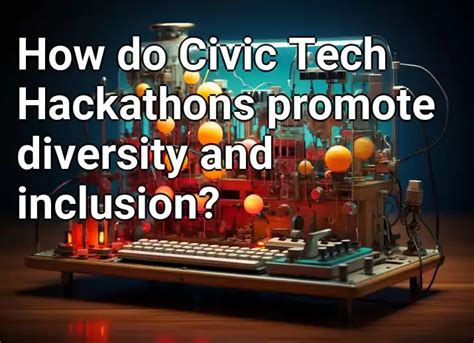In today's digital age, technology has become an integral part of our lives, transforming the way we interact, work, and live. The impact of technology is not limited to the private sector; it has also started to influence the way governments function and interact with citizens. This is where civic tech comes into play, leveraging technology to improve governance, citizen engagement, and public services. One effective way to drive innovation in governance is through civic tech hackathons.
A civic tech hackathon is an event that brings together citizens, developers, designers, and policymakers to develop innovative solutions to pressing civic issues. These events provide a platform for collaboration, creativity, and problem-solving, resulting in the development of practical solutions that can be implemented to improve governance and public services.
What is Civic Tech?
Civic tech, short for civic technology, refers to the use of technology to improve civic engagement, participation, and governance. It encompasses a wide range of initiatives, from online platforms for citizen engagement to data analytics for better decision-making. Civic tech aims to increase transparency, accountability, and efficiency in government, making it more responsive to the needs of citizens.
The Benefits of Civic Tech Hackathons
Civic tech hackathons offer numerous benefits, including:
- Innovative solutions: Hackathons provide a platform for creative problem-solving, resulting in innovative solutions that can be implemented to improve governance and public services.
- Citizen engagement: Civic tech hackathons encourage citizen participation, enabling individuals to contribute to the development of solutions that affect their lives.
- Collaboration: Hackathons foster collaboration between citizens, developers, designers, and policymakers, promoting a culture of cooperation and co-creation.
- Improved governance: By leveraging technology, civic tech hackathons can help improve governance, making it more transparent, accountable, and efficient.
How to Organize a Civic Tech Hackathon
Organizing a civic tech hackathon requires careful planning and execution. Here are some steps to consider:
- Define the theme: Identify a specific theme or challenge that the hackathon will focus on, such as improving public transportation or enhancing citizen engagement.
- Assemble a team: Bring together a team of organizers, including developers, designers, and policymakers, to help plan and execute the event.
- Secure funding: Secure funding to support the event, including prizes, venue rental, and marketing.
- Promote the event: Promote the event through social media, email marketing, and local outreach to attract participants.
- Provide resources: Provide participants with resources, including data, APIs, and mentorship, to support the development of innovative solutions.
Examples of Successful Civic Tech Hackathons
There are numerous examples of successful civic tech hackathons around the world. Here are a few:
- New York City's BigApps: BigApps is an annual civic tech competition that challenges developers to create innovative solutions to improve life in New York City.
- Boston's Civic Tech Hackathon: Boston's civic tech hackathon brings together citizens, developers, and policymakers to develop solutions to pressing civic issues.
- Kenya's iHub: iHub is a civic tech hub in Nairobi that hosts regular hackathons and events to promote innovation and entrepreneurship in governance.
Challenges and Limitations
While civic tech hackathons offer numerous benefits, there are also challenges and limitations to consider:
- Sustainability: One of the biggest challenges facing civic tech hackathons is sustainability, ensuring that solutions developed during the event are implemented and maintained over time.
- Inclusivity: Civic tech hackathons must be inclusive, ensuring that all citizens have an opportunity to participate, regardless of their background or socioeconomic status.
- Scalability: Solutions developed during civic tech hackathons must be scalable, able to be implemented and maintained across different contexts and jurisdictions.
Best Practices for Civic Tech Hackathons
To ensure the success of a civic tech hackathon, here are some best practices to consider:
- Clearly define the theme and challenge: Ensure that the theme and challenge are clearly defined and communicated to participants.
- Provide adequate resources: Provide participants with adequate resources, including data, APIs, and mentorship, to support the development of innovative solutions.
- Foster collaboration: Foster collaboration between citizens, developers, designers, and policymakers to promote a culture of cooperation and co-creation.
- Ensure inclusivity: Ensure that all citizens have an opportunity to participate, regardless of their background or socioeconomic status.

Gallery of Civic Tech Hackathons




Frequently Asked Questions
What is a civic tech hackathon?
+A civic tech hackathon is an event that brings together citizens, developers, designers, and policymakers to develop innovative solutions to pressing civic issues.
How can I participate in a civic tech hackathon?
+To participate in a civic tech hackathon, register for the event on the organizer's website or social media page. Ensure you meet the eligibility criteria and follow the registration instructions carefully.
What are the benefits of a civic tech hackathon?
+The benefits of a civic tech hackathon include innovative solutions, citizen engagement, collaboration, and improved governance.
In conclusion, civic tech hackathons offer a unique opportunity to drive innovation in governance, citizen engagement, and public services. By bringing together citizens, developers, designers, and policymakers, these events can result in practical solutions that improve the lives of citizens. As the world becomes increasingly digital, the importance of civic tech hackathons will only continue to grow.
